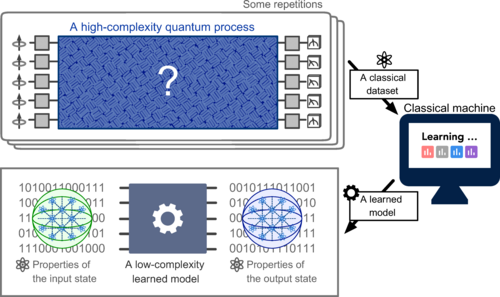Researchers Hsin-Yuan Huang, Sitan Chen, and John Preskill from Caltech, UC Berkeley, and the AWS Center for Quantum Computing have developed an efficient machine-learning algorithm for predicting any unknown quantum process. The algorithm can predict the output of complex quantum dynamics faster than the time needed to run the process itself. The team’s work highlights the potential for machine learning models in quantum computing, and could provide a foundation for using classical machine learning to simulate quantum dynamics.
Quantum Process Prediction Using Machine Learning
A team of researchers from the Institute for Quantum Information and Matter and Department of Computing and Mathematical Sciences at Caltech, the Department of Electrical Engineering and Computer Sciences at UC Berkeley, and the AWS Center for Quantum Computing have developed an efficient machine-learning (ML) algorithm for predicting any unknown quantum process over n qubits. The algorithm can predict the output of complex quantum dynamics much faster than the time needed to run the process itself.
The Machine Learning Algorithm
The ML algorithm developed by Hsin-Yuan Huang, Sitan Chen, and John Preskill is computationally efficient even when the unknown process is a quantum circuit with exponentially many gates. The algorithm combines efficient procedures for learning properties of an unknown state and for learning a low-degree approximation to an unknown observable. The analysis hinges on proving new norm inequalities, including a quantum analogue of the classical Bohnenblust-Hille inequality.
The Quantum Process
The quantum process in question is a complex one, involving an unknown n-qubit completely positive trace-preserving (CPTP) map E that represents a physical process happening in nature or in a laboratory. The task is to learn to predict functions of the form f(ρ,O) = tr(OE(ρ)), where ρ is an n-qubit state and O is an n-qubit observable.
The Machine Learning Model
The ML model can predict outcomes for highly entangled states ρ after learning from a training set that only contains data for random product states. The ML algorithm is entirely classical except for the step of obtaining the reduced density matrices (RDM) of the input state ρ, which may require quantum computation. If the RDMs of ρ can be computed classically then we have a classical ML algorithm that can predict an arbitrary quantum process E after learning from data.
The researchers provide a rigorous guarantee for the prediction error of the ML model. They consider the average-case prediction performance under an arbitrary n-qubit state distribution D invariant under single-qubit Clifford gates, which means that the probability distribution of sampling a state ρ is equal to that of sampling UρU† for any single-qubit Clifford gate U.
Implications and Future Work
The results of this research have implications for several previously studied problems. The proof that one can always train an ML model that runs in quasipolynomial time, even for exponential-time quantum dynamics, provides rigorous support for the potential of using hybrid quantum-classical ML algorithms to learn to model exotic quantum dynamics occurring in nature. The researchers also highlight several open problems that remain to be answered, such as obtaining computationally efficient learning algorithms for any “smooth” distribution over quantum state space.
“The theorem established in this work shows that learning to predict a complex quantum process can be achieved with computationally efficient ML algorithms. Once we have obtained training data by accessing the unknown process E sufficiently many times, the proposed ML algorithm is entirely classical except for the step of obtaining the RDM of the input state ρ, which may require quantum computation.”
Hsin-Yuan Huang, Sitan Chen, and John Preskill
Several open problems remain to be answered. While we focus only on locally flat distributions D, we believe that efficient ML algorithms also exist for other general classes of distributions. An important open problem is hence the following: can we obtain computationally efficient learning algorithms for any “smooth” distribution over quantum state space?”
A better understanding of these problems would illuminate the ultimate power of classical and quantum ML algorithms for learning about physical dynamics.
Summary
Researchers have developed an efficient machine-learning algorithm that can predict any unknown quantum process over n qubits, even when the process involves a quantum circuit with exponentially many gates. The algorithm’s potential to predict the output of complex quantum dynamics faster than the process itself could have implications for quantum machine learning, variational quantum algorithms, and quantum benchmarking.
- Researchers Hsin-Yuan Huang, Sitan Chen, and John Preskill from the Institute for Quantum Information and Matter, Department of Computing and Mathematical Sciences, Caltech, Department of Electrical Engineering and Computer Sciences, UC Berkeley, and AWS Center for Quantum Computing have developed an efficient machine-learning algorithm for predicting any unknown quantum process.
- The algorithm can predict any local property of the output from the unknown process with a small average error over input states.
- The algorithm is computationally efficient even when the unknown process is a quantum circuit with exponentially many gates.
- The researchers have combined efficient procedures for learning properties of an unknown state and for learning a low-degree approximation to an unknown observable.
- The algorithm can accurately predict outcomes for highly entangled states after learning from a training set that only contains data for random product states.
- The researchers believe that their work highlights the potential for machine learning models to predict the output of complex quantum dynamics much faster than the time needed to run the process itself.

